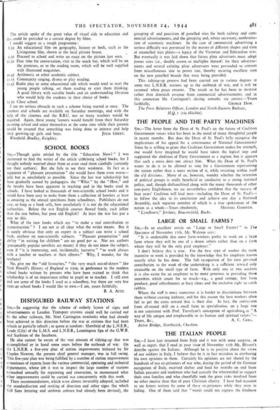SCHOOL BOOKS
Stn,—Though quite misled by the title " Education Now? " I was interested to find the writer of the article -cri'tic'ising schoial -books, for I thought nobody wearied about them or even read them carefully (certainly not their authors). But she fails to see their weakness. In fact as a supporter of " pleasant presentation " she would have them even worse— jolly but as unscholarly as possible. Since the last war scholarship has been gradually ousted by pedagogics, the " What " by the " Flow," and the results have been apparent in teaching and in the books used in schools. I have looked at thousands of non-scientific school books and it would have been easy to make from them a collection of howlers at least as amusing as the annual specimens from schoolboys. Publishers do not care, so long as a book sells, how unscholarly it is nor do the educational authorities. Before the war English courses flowed freely, each jollier than the one before, but poor old English! At least the war has put a stop to this.
What of the new books which are " to make a real contribution to reconstruction " ? I am not at all clear what the writer means. But it is surely obvious that only an expert in a subject can write a school book, anyhow on non-scientific subjects. "Pleasant presentation " and ability " in writing for children " are no good per se. Nor are authors (presumably popular novelists are meant) if they do not know thesubject, even if " it is interesting, and, incidentally, lucrative " "to work alWays with a teacher or teachers at their elbows." Why, I wonder, for the teachers?
No, give me the "old favourites," " the very much out-of-daters " like York Powell's History of England to 1509, in preference to the modern school books written by persons who have been trained to think that scholarship is of no importance either to pupil or to teacher. I still own and use some of the books I used as a schoolboy, but there are very few 1920-40 school books I would like to own.—I am, yours faithfully, R. A. AUTY.


























 Previous page
Previous page